One of my old college friends died yesterday. Or was it the day before? Dan (Daniel Wilson Bates, Jr.) wrote film criticism for Newsday and Film Quarterly, among other publications; managed film theatres (so spelled, harumph!) in Southern California, including the Los Feliz in L.A.; did a lengthy stint as a Public Broadcasting classical music host and announcer (deep-voiced guy, Dan; imagine Sean Connery without the accent), and took up acting by playing, for a few years running, a Beefeater at the Dallas area Renaissance Pleasure Faire.
At TCU, we called him "Master Bates" just to poke fun. Some made up jokes about his wife's seeming domineering manner and especially her nightly command to "take the cat out, Dan" which, in a self-consciously caustic satire I produced on reel-to-reel tape, doing both their voices myself, I transformed into "take out the cat box, Dan." But Dan Bates was the Film Buff's Film Buff, at least where 20th century movies are concerned. He turned me on to many films, including Sam Peckinpah's Ride the High Country, that Joel McCrea-Randolph Scott take on grumpy old men. (Scott seemed less wooden in pre-senility that in countless prior outings, including the great Budd Boetticher films.) It was a clear signal to anyone paying attention that Peckinpah was destined for the celebrity that brought him to such masterpieces as The Wild Bunch.
Dan also acted as a mentor after a fashion. He was the first of us to get film reviews printed in Ernest Callenbach's Film Quarterly which, although published in Berkeley, greatly influenced the film division of UCLA's School of Fine Arts, where I would eventually land to work on a master's in film. Once, in the Quarterly, Dan submitted a piquant summation of the value of a film whose title and his review went: "I Saw What You Did"...And I wish to God I hadn't." Now, really, in a magazine section titled "Shorter Notices," isn't that the essence of brevity and yes, wit.
I couldn't let Master Bates one-up me in the writing department, so I started submitting my own shorter notices to the publication, and Callenbach published them. Neither Dan nor I ever had a lengthy essay printed in that quarterly magazine. But I did get to strike up and maintain a fairly long correspondence with Callenbach, who seemed to appreciate my views.
In fact, after writing one on John Boorman's Point Blank, Callenbach wrote back to suggest that I was a hardcore "Hitchcocko-Hawksian," which made my day! (Not that the Boorman film had any resemblance to anything directed by those two remarkable filmmakers; he'd simply picked up on a subtext in my writings.)
Dan and his film buff friends, including the eventual Fort Worth Star-Telegram critic, Perry Stewart, would spend considerable time compiling what we called our "Ten Best" lists. When you are young you do not understand how pointless such exercises are; in fact, any endeavor factoring in arguments of a purely subjective sort.
When we were not debating our respective Ten Best lists, we discussed the hottest trend in film at the time (the mid-1960's): the auteur theory. The French New Wave directors -- Truffaut, Godard, et al. -- championed American films that were overlooked by mainstream (e.g. Time, Newsweek) critics in the directors' own country (or, in the case of Wilder, Sirk, et al., in their adopted country) only because, to the French critics, spurred on by the great Henri Langlois, found a "figure in the carpet" beneath the feet of Ford, Hawks, Hitchcock, and a few other American filmmakers. In other words, each of their films was said to be a pure expression of the director's personality. No matter that these auteur critics (who often became celebrated movie makers themselves) sometimes downgraded some perfectly good movies because the director might make movies that amounted to, as American auteur Andrew Sarris put it, "strained seriousness."
Dan was only quasi-auteur, since he liked movies that weren't in Sarris's book, American Directors, or at least were not in the "Pantheon" section -- or even in "Lightly Likeable" for that matter. Little did I know at the time that when the nation's most authoritative mainstream critic, Pauline Kael (of the New Yorker) visited our directing class at UCLA, the two of us got into a fairly heated argument about the merits of Fellini's Otto i Mezzo ("8 1/2"), which some thought as much of a milestone as Griffith's The Birth of a Nation or Welles's Citizen Kane. Had she wanted to throw up an example of why the auteur theory didn't hold water, Kael might have pointed to Casablanca, which has a popular reputation as the country's greatest film, while to auteurs it simply couldn't be: Michael Curtiz wasn't so important as director's went.
Also, Dan liked movies some others thought awful. Which suggests he was years ahead of his time, not just because the notion of the "good bad film" had not yet come into being, but because some of the pictures have become classics, or at least cult favorites. For example, he liked Edgar G. Ulmer (and especially Detour, shot in one week for next to nothing); the Sam Fuller of The Naked Kiss, and even the very obscure work of Joseph Kane, in whose Brimstone (1949), a cattleman-turned-outlaw played by Walter Brennan, warns good guy Rod Cameron he'll "nail your hide to my barn door!" Unforgettable, simply unforgettable.
But Dan Bates had another passion, one that earned him renown on blogs and websites devoted to the subject: film scores. He was passionate about Dmitri Tiomkin, even when I pointed out to him that one of the main themes in his score for Giant! was taken almost note for note from Gustav Mahler's 8th Symphony. No matter, I would eventually come to the conclusion that all, or almost all, movie soundtrack composers cribbed shamelessly from the classics, as witness John Williams' quoting from Disney and Debussy in Close Encounters. Actually, I put Tiomkin high in my own patheon, but Miklos Rozsa was way up there, too, and of course the brilliant Bernard Herrmann.
Nor could I shake Dan in his faith by pointing out that the reason Tiomkin achieved his "sound" -- a lush, dense, ethereal effect -- was that, in most if not all his scores, he recorded them using the Accademia Nazionale di Santa Cecilia Orchestra, nowadays helmed on occasion by one of my favorite conductors, Myung-Whun Chung. This collaboration was particularly effective in the recording of the music for such films as The Unforgiven (John Huston, 1960) and The Guns of Navaronne (J. Lee Thompson, 1961). Tiomkin was a very busy man. If ever there were an "auteur" film composer, Tiomkin fit the bill. But, hey, so did Rozsa. So did Herrmann. In fact, sometimes their scores overwhelmed the auteur directing the films they worked on.
Subscribe to:
Post Comments (Atom)
+(2).jpg)
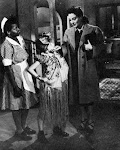.jpg)
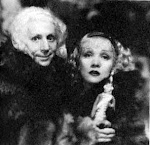+(3).jpg)
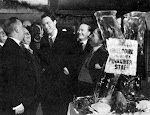+(4).jpg)
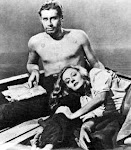+(7).jpg)
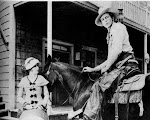.jpg)
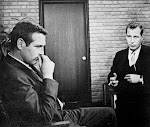+(6).jpg)
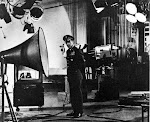+(5).jpg)
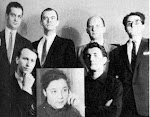.jpg)

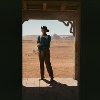
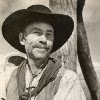



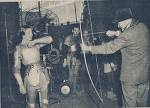
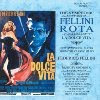
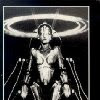
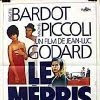

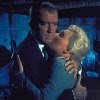
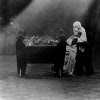
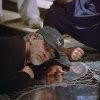





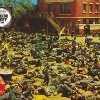

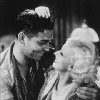


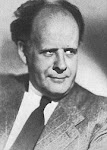














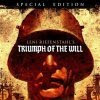


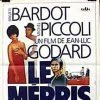
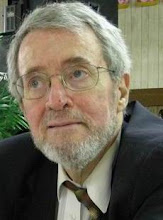

No comments:
Post a Comment